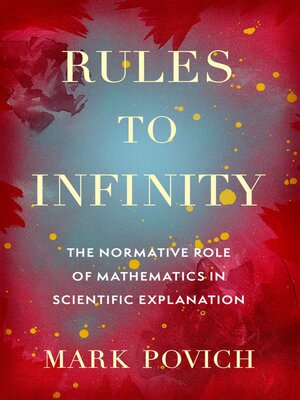Rules to Infinity
ebook ∣ The Normative Role of Mathematics in Scientific Explanation
By Mark Povich

Sign up to save your library
With an OverDrive account, you can save your favorite libraries for at-a-glance information about availability. Find out more about OverDrive accounts.
Find this title in Libby, the library reading app by OverDrive.



Search for a digital library with this title
Title found at these libraries:
| Library Name | Distance |
|---|---|
| Loading... |
This is an open access title available under the terms of a CC BY-NC-ND 4.0 International licence. It is free to read on the Oxford Academic platform and offered as a free PDF download from OUP and selected open access locations. One of the central aims of science is to provide explanations of natural phenomena. What role does mathematics play in achieving this aim? How does mathematics contribute to the explanatory power of science? Rules to Infinity defends the thesis that mathematics contributes to the explanatory power of science by expressing conceptual rules that allow for the transformation of empirical descriptions. It claims that mathematics should not be thought of as describing, in any substantive sense, an abstract realm of eternal mathematical objects, as traditional Platonists have thought. This view, which Mark Povich calls "mathematical normativism," is updated with contemporary philosophical tools, which are used to form the argument that normativism is compatible with mainstream semantic theory. This allows the normativist to accept that there are mathematical truths, while resisting the Platonistic idea that there exist abstract mathematical objects that explain such truths. There is a distinction between scientific explanations that are in some sense distinctively mathematical—those that explain natural phenomena in some uniquely mathematical way—and those that are only standardly mathematical, and Povich defends a particular account of this distinction. Rules to Infinity compares normativism to other prominent views in the philosophy of mathematics, such as neo-Fregeanism, fictionalism, conventionalism, and structuralism, and offers an entry point into debates at the forefront of philosophy of science and mathematics as it defends its novel positions.







